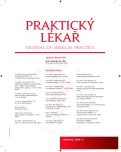-
Medical journals
- Career
Colorectal carcinoma and obesity
Authors: Z. Adamová 1; R. Slováček 1; A. Geršlová 2
Authors‘ workplace: Chirurgické oddělení, Vsetínská nemocnice a. s. Primář: MUDr. Jaroslav Sankot 1; Chirurgické oddělení, Nemocnice Břeclav Primář: MUDr. Martin Kříž 2
Published in: Prakt. Lék. 2014; 94(3): 145-147
Category: Of different specialties
Overview
Background:
Obesity constitutes the fifth leading risk for overall mortality. Mounting evidence indicates that obesity may be associated with the risk of colorectal cancer. The aim of this study is to evaluate the association between obesity and risk of colorectal cancer in our region.Methods:
We retrospectively compared body mass index of a group of 80 patients, who underwent surgery in our department for colorectal cancer between 1/2010 and 1/2012 with control group of 80 consecutive patients admitted to our department 7–8/2013 for other diagnosis. To determine the risk factors statistical analyses were performed using Mann–Whitney U test, Fisher’s exact test.Results:
70% of patients with colorectal cancer were overweight, 58% of the control group was overweight, there was no significant difference.Conclusions:
We did not prove the results of other studies, probably due to small study groups. Larger study in the Czech Republic should be performed. Simultaneously weight loss due to colorectal cancer may misrepresent our results. Considering higher postoperative morbidity and shorter life expectancy of obese patients with colorectal cancer we should still recommend our patients to maintain normal weight.Keywords:
colorectal cancer – obesity – BMI
Sources
1. Amemori S, Ootani A, Aoki S, et al. Adipocytes and preadipocytes promote the proliferation of colon cancer cells in vitro. Am J Physiol Gastrointest Liver Physiol 2007; 292(3): 923–929.
2. Almendingen K, Hofstad B, Vatn MH. Does high body fatness increase the risk of presence and growth of colorectal adenomas followed up in situ for 3 years? Am J Gastroenterol 2001; 96(7): 2238–2246.
3. Bergström A, Pisani P, Tenet V, et al. Overweight as an avoidable cause of cancer in Europe. Int J Cancer 2001; 91(3): 421–430.
4. Bianchini F, Kaaks R, Vainio H. Overweight, obesity, and cancer risk. Lancet Oncol 2002; 3(9): 565–574.
5. Boeing H. Obesity and cancer-the update 2013. Best Pract Res Clin Endocrinol Metab 2013; 27(2): 219–227.
6. Daňková Š, Holub J, Láchová J. Evropské výběrové šetření o zdraví v ČR EHIS 2008 [on line] 2011-04 [cit. 2013-08-19]. Dostupný na: www.szu/cz/uploads/documents/chzp/zdra:stav/vyskyt_nadvahy_a_obezity.pdf.
7. Dušek L, Mužík J, Májek O, Pavlík T. Kolorektální karcinom v ČR – data minulá a budoucí. Rozhl. Chir. 2012; 91(1): 39–43.
8. Friedenreich CM. Physical activity and cancer prevention: from observational to intervention research. Cancer Epidemiol Biomarkers Prev 2001; 10(4): 287–301.
9. Haydon AM, Macinnis RJ, English DR, Giles GG. Effect of physical activity and body size on survival after diagnosis with colorectal cancer. Gut 2006; 55(1): 62–67.
10. Larsson SC, Wolk A. Obesity and colon and rectal cancer risk: a meta-analysis of prospective studies. Am J Clin Nutr 2007; 86(3): 556–565.
11. Ma Y, Yang Y, Wang F, et al. Obesity and risk of colorectal cancer: a systematic review of prospective studies. PLoS One 2013; 8(1): e53916. Doi: 10.1371/journal.pone.0053916.
12. Otani T, Iwasaki M, Sasazuki S, et al. Plasma C-peptide, insulin-like growth factor-I, insulin-like growth factor binding proteins and risk of colorectal cancer in a nested case-control study: the Japan public health center-based prospective study. Int J Cancer 2007; 120(9): 2007–2012.
13. Reddy BS, Wang CX, Maruyama H. Effect of restricted caloric intake on azoxymethane-induced colon tumor incidence in male F344 rats. Cancer Res 1987; 47(5): 1226–1228.
14. Samad AK, Taylor RS, Marshall T, Chapman MA. A meta-analysis of the association of physical activity with reduced risk of colorectal cancer. Colorectal Dis 2005; 7(3): 204–213.
15. Slattery ML, Wolff RK. Leptin and colorectal cancer: an undefined link. Nat Clin Pract Gastroenterol Hepatol 2007; 4(3): 118–119.
16. Smith MR, Lee H, Nathan DM. Insulin sensitivity during combined androgen blockade for prostate cancer. J Clin Endocrinol Metab 2006; 91(4): 1305–1308.
17. Švestka T, Krechler T, Žák A. Prevence u kolorektálního karcinomu. Postgrad Med 2012; 14(Suppl 4): 58–61.
18. Tannenbaum A. Relationship of body weight to cancer incidence. Arch Pathol 1940; 30 : 509–517.
19. Wei EK, Giovannucci E, Fuchs CS, et al. Low plasma adiponectin levels and risk of colorectal cancer in men: a prospective study. J Natl Cancer Inst 2005; 97(22): 1688–1694.
20. Zavoral M, Suchánek Š, Májek O, et al. Populační screening kolorektálního karcinomu v České republice. Rozhl. chir. 2009; 88(6): 292–294.
Labels
General practitioner for children and adolescents General practitioner for adults
Article was published inGeneral Practitioner

2014 Issue 3-
All articles in this issue
- Facial pain: rhinosinusitis or other reason?
- Surgical treatment of post prostatectomy incontinence
- Allergy vaccine in general practice
- Children poisoning – experiences of Poisons Information Centre in Prague
- Results of Adam’s test of scoliotic vertebral rotation in primary school students
- Haemorrhoid treatment at the 3rd surgery department – 15-years experience
- Colorectal carcinoma and obesity
- Obligations of the physician (doctor) in sickness insurance
- Non-CF bronchiectasis
- General Practitioner
- Journal archive
- Current issue
- Online only
- About the journal
Most read in this issue- Allergy vaccine in general practice
- Children poisoning – experiences of Poisons Information Centre in Prague
- Facial pain: rhinosinusitis or other reason?
- Results of Adam’s test of scoliotic vertebral rotation in primary school students
Login#ADS_BOTTOM_SCRIPTS#Forgotten passwordEnter the email address that you registered with. We will send you instructions on how to set a new password.
- Career

